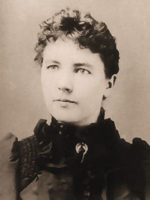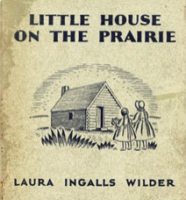The way we were…

Laura Ingalls Wilder
How did the Ingalls girls get such a stellar education?
The education received by the characters in the Little House on the Prairie books has long amazed readers. How in the world did the Ingalls girls manage to get such a stellar education in the midst of primitive surroundings and a transitory lifestyle in the 19th century?
In honor of Laura’s 151st birthday on February 7th (2018), here are five key educational practices that may have contributed to her success:
1. Simple Phonics
Laura began her first day of school without knowing all of her alphabet. Yet by focusing on letters and their sounds, Laura’s teacher taught her to read in a single morning!
Whenever Teacher had time, she called Laura to her desk and helped her read letters. Just before dinner-time that first day, Laura was able to read, C A T, cat. Suddenly she remembered and said, “P A T, Pat!”
Teacher was surprised.
“R A T, rat!” said Teacher. “M A T, mat!” And Laura was reading! She could read the whole first row in the speller.
2. Behavior Standards
Laura’s parents taught their daughters the importance of good behavior in school. Such behavior extended to respect for the teacher – even when that teacher was being unfair.
Then Pa spoke sternly. “You girls will go back to school tomorrow morning, and go on as though none of this had happened. Miss Wilder may have been wrong, but she is the teacher. I cannot have my girls making trouble in school.”
“No, Pa. We won’t,” they promised.
3. Teaching Others
It is often said that people learn the best when they have to teach something to others. Growing up attending a one-room school, Laura likely had a number of opportunities to be a tutor to her younger classmates. She also practiced her teaching skills at home by relaying her school lessons to her blind sister Mary. In a sense, one could say that Laura was a pioneer in special education!
Every night after supper she put her books and her slate on the red-checkered tablecloth in the lamplight, and she studied next day’s lessons with Mary. She read the arithmetic problems aloud, and Mary did them in her head while she worked them on the slate. She read the history lesson and the geography to Mary until both of them could answer every question.
 4. Focus on Basics
4. Focus on Basics
In today’s world of auto-correct and spell check, instruction in basic subjects like spelling is often bypassed. But not in Laura’s day. She was a world class speller and this skill undoubtedly served her well later in life as well as in spelling bees during her school years.
Laura was in her element. She loved to spell. Her toes on a crack in the floor and her hands behind her, she spelled every word that came to her. Down went four from the enemy’s side, and three from Pa’s, then the word came to Laura. She took a deep breath and glibly spelled, “Differentiation: d-i-f, dif; f-e-r, fer, differ; e-n-t, ent, different; i, differnti; a-t-i-o-n, ashun; differentiation!”
5. Memorization of Facts
“Drill and kill” was not looked down upon in Laura’s day, and the continual memorization of facts likely expanded her memory capacity, allowing her to complete dizzying mental arithmetic problems …
Mental arithmetic was even harder. Laura disliked arithmetic. Her heart beat desperately when her turn came and she was sure she would fail. She stood amazed, hearing her voice going glibly through problems in short division. “Divide 347,264 by 16. Sixteen into 34 goes twice, put down 2 and carry 2; sixteen into 27 goes once, put down 1 and carry 11 … twenty-one thousand, seven hundred and four.”
…and a thorough recitation of American history:
“This school needs a larger building,” Mr. Owen said to Laura and Ida one day at recess. “I am hoping that the town can afford to build one next summer. … I am counting a great deal upon the showing we make at the School Exhibition, to acquaint the people with the school and its needs.”
After that, he told Laura and Ida that their part in the Exhibition would be to recite the whole of American history, from memory.
These vignettes from Laura’s life give us good educational food for thought. Would the education system be wise to reinstate some or all of practices in today’s schools?
Written by Annie Holmquist and published by Intellectual Takeout ~ February 5, 2016
RELATED: Laura Ingalls Wilder’s Name Pulled From Literary Award Over ‘Stereotypical Attitudes‘ in Books

Annie Holmquist, author
~ The Author ~
Annie is Editor of Intellectual Takeout. In her role, she assists with website content production and social media messaging.
Annie received a B.A. in Biblical Studies from the University of Northwestern-St. Paul. She also brings 20+ years of experience as a music educator and a volunteer teacher – particularly with inner city children – to the table in her research and writing.
In her spare time Annie enjoys the outdoors, gardening, reading, and events with family and friends.

